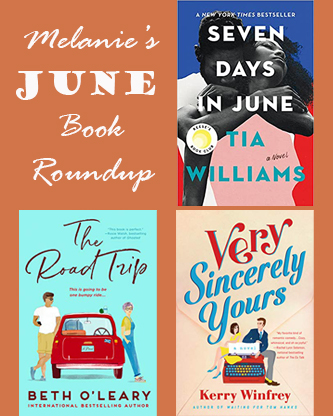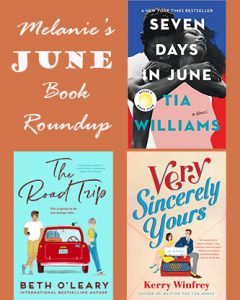
We are halfway through 2021! Can you believe it? If things continue as they have gone thus far, I’m on track to read about 120 books this year, which, as a historically slow reader, kind of blows my mind. (I still read slowly. Audiobooks help, but I also simply read for more hours of the day than I used to.)
I’m also about to run out of space in my reading journal, which has unfortunately been discontinued, so if you have any recommendations for great ones, let me know. Otherwise, I’ll be stuck using a regular journal and formatting the pages in some fashion… Real problems, I tell you.
This month, I read ten books, primarily in audio. #AudiobooksCount #AudiobookDefenseLeague
As always, I’ve transcribed the excerpts below. I did my best to punctuate them accurately, but I apologize for any mistakes.
My standouts also happen to all be June releases, so place your holds now if you’re a library patron as these are all pretty hot, new titles.
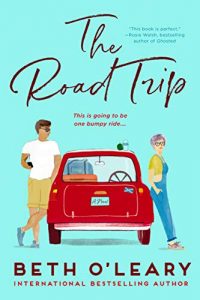
My first favorite book this month was Beth O’Leary’s The Road Trip. I was looking forward to it after loving her debut, The Flatshare, and I liked this one even more.
The setup here is pretty great. Addie and Dylan broke up almost two years ago. Now, they’re each on their way in separate cars to a mutual friend’s wedding in Scotland. Romance reasons place Dylan’s car directly behind Addie’s near the start of the trip, and he accidentally rear-ends her. They, along with their passengers (Addie with her sister and another acquaintance, Dylan with his best friend, Marcus), wind up all cramming into Addie’s Mini Cooper to complete the long drive to the wedding.
One fiasco after another slows them down, prolonging the awkward reunion and forcing them deal with unresolved feelings. And the tension isn’t only between Addie and Dylan. Addie has about as much emotional baggage with Marcus, who played a key role in the events of the past. Through yo-yo-ing timelines, we get the full story of Addie and Dylan’s relationship and breakup alongside their present-day ill-fated road trip.
First of all, I’m a sucker for second chance romances. I don’t always love how heavy these books can be on flashbacks or full-on Then and Now timelines, but I do enjoy the unfolding of details about what went wrong the first time and getting to see the characters change to make it work this time. It’s the dark night of the soul or low moment but right there at the beginning of the book. There’s something deeply uplifting, when the story is handled well, about seeing what is usually just that last stretch where they have to make amends, change their ways, etc. as the meat of the story.
Early in the book, once they’ve begun the drive together, Dylan thinks, “If one could harness secrets for energy, we wouldn’t need petrol. We’d have enough grudges in this car to take us all the way to Scotland.” This right here is my catnip. Secrets, grudges, and no way to avoid them!
This particular book hits these buttons for me, but it also does something a little more complex in how it uses Marcus. Marcus is charismatic, wealthy, and loyal, and he and Dylan have been through some experiences that have really bonded them. Their friendship is also toxic and co-dependent. Dylan’s take on Marcus is this: “He brings out the bravery in me. With Marcus by my side, I’m somebody. The sort of man who throws caution to the wind, who defies his father, who chooses [to study] poetry when he ought to know better.”
It’s clear in the past storyline that whatever Marcus does to augment Dylan’s life, he also pretty easily influences and leads Dylan around. Prior to Addie, the two men slept with the same woman, essentially sharing her and highlighting a lack of boundaries in their friendship. When Dylan gets serious with Addie, Marcus grapples with the changing dynamic in his own relationship with Dylan in ways that undermine Addie.
I was pleasantly surprised by this nuanced portrayal of not only such a unique male-male friendship within a romance novel, but also the acute representation of the toxic aspect of it and how forgiveness plays out in more than the romance. Dylan asks Addie when you should give up on a person, and she replies easily, “When they’re bad for you.”
It’s not that simple in Dylan’s eyes. But we learn that, in the present storyline, Dylan and Marcus went through their own breakup of sorts after things fell apart between Dylan and Addie. Marcus is so central to Dylan as a character and to what happens between Dylan and Addie that it really feels like the book is about the whole triad rather than just the couple. I found it very complex and satisfying.
I always note favorite lines or moments in a reading journal, but this book is odd in that it wasn’t hugely quotable for me despite being very funny and sharply insightful. The humor often comes from relatable asides from the POV characters, things that genuinely made me chuckle to myself, as well as from the disjoint of “straight man” POV characters dealing with somewhat absurd people and situations. Overall, it’s a funny book that also goes to some heart-wrenching places.
Content notes for mental illness, sexual assault, stalking, and toxic relationships, but even with some heavy themes, this is an uplifting summer read.
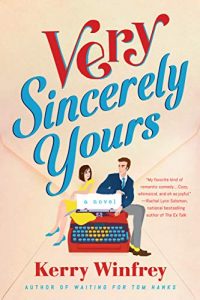
Next up is Kerry Winfrey’s new release, Very Sincerely Yours, which actually reminded me a little bit of Beth O’Leary’s first book, The Flatshare. This one also gives us a main character, Theodora, aka “Teddy,” who has just gotten out of a relationship with hallmarks of emotional abuse, including damaging criticism and forced isolation from her friends.
Teddy is strengthened by those same friends in the aftermath of the breakup, and she embarks on a mission to do something that scares her every day in the hopes of rediscovering herself and finding some direction. She also begins to email the host of Everett’s Place, a local children’s puppet show, who happens to look, as one side character notes, like “a hot Mr. Rogers.”
Everett has his flaws – mainly, he’s a workaholic and a perfectionist, and his drive to make his show a success sometimes back-burners his relationships – but he is a refreshing male main character in that he has emotional intelligence and relationship skills that are typically coded feminine. He is a hero who doesn’t need to be saved, fixed, or trained to be on equal emotional footing and able to love the heroine well.
I have a theory about a crop of newer heroes like Everett, but my main guess about why they work (for me anyway) is that these dudes don’t require as much effort from their potential romantic partners. Often, they are the ones helping the heroine get her messy life back on track. In other words, they are doing the work heroines (and real-life women) have been doing forever. They have solid support systems in friends and family. They go to therapy. They can talk about their feelings.
In Everett’s case, he straight-up teaches children how to manage their emotions in healthy ways. He takes his role very seriously in his daily life, not just when he’s on camera. In a moment of self-doubt, when he feels unfulfilled but can’t figure out why, he tells himself, “Buck up, you idiot,” but quickly backtracks “because he would absolutely destroy someone who told any of his child viewers something like that.”
Instead, he tells his reflection, “It’s okay to feel your feelings.” It doesn’t solve his problem, which is more complicated than what a lot of his viewers need help with, but it’s a nice moment where we see a man treating himself tenderly and earnestly exploring his deeper feelings, even though it feels kind of unnatural at first, and I don’t know, I find that remarkably beautiful. This is something we could afford to normalize.
By contrast, Teddy has been mired in her ex’s criticism and neglect. “When I was with Richard,” she confides to Everett, “I didn’t ever feel like he was really listening to me when I talked, or like he valued what I said. It seemed like I was some sort of instrumentation for him, like a hood ornament on the BMW of his life. And when I saw your show for the first time, I couldn’t get over the way you talked to kids, like they mattered. Like you saw them all for the people they were, not for the people you thought they should be.”
This book really sings during Teddy and Everett’s email exchanges. They’re snappy and funny and playful, and they lay an honest and authentic foundation for their relationship. I particularly love when Teddy feels anxious about joining her boss at her jazzercise class – a new thing that scares her – and Everett first muses about going to the class himself. He ponders whether a very tall man like him would be unwelcome to the women in that space – another moment of self-awareness and empathy – then shifts to encouragement, writing, “I hope you gain so much strength through jazzercise that you’re able to dropkick your shitty ex in the face.”
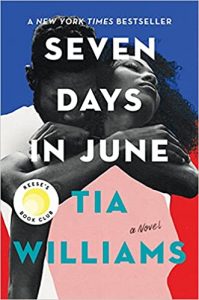
My last great read this month was Tia Williams’s Seven Days in June. I know writers aren’t supposed to write about writers, but as one myself, I’ll admit to loving it. My favorite romance is still Beach Read, also a book about two writers, and this one is a great new title in that vein. And hey, it’s also a second chance romance!
At seventeen, Eva and Shane, both in the throes of pretty rough childhoods, meet and share an intense week together. They fall fast and hard, only to split just as quickly under traumatic circumstances. Now, as adults, they are both successful writers. He’s a literary darling. She has a rabid fanbase for her fourteen-title paranormal erotic romance series. By chance, they reunite at a book event and realize the passion they once had is still there, mixed in with unresolved hurts. The bulk of the book takes place during the week of this reunion with several glimpses into the week from their past.
I have never dropped more bookmarks than I did in this book. It has so many great quotes, and there’s an entire scene I’d transcribe in its entirety in my reading journal if I had the space. I can’t share from that scene (if you’ve read it, it’s the café scene when they first talk as adults) because it would spoil one of the book’s main plot twists, so instead, here’s an example of something I love in books about writers, when things get a little meta: “‘I’ve changed.’ His confident smile made it believable. ‘I think this is what writers calls a character arc.’”
Also, this bit of wisdom from a side character: “Prose before bros.”
This book tackles so many Big Things. Eva struggles with chronic, debilitating migraines that she masks as much as possible to do book events and to parent, even when she has to “mother from bed.” Eva articulates the differences between what women in the industry have to do versus men – being present on social media, networking, doing events, while Shane can disappear and stay relevant. At one point, when her series gets optioned for a film adaptation, she has to deal with a prospective director wanting white actors to play her Black characters. Both Eva and Shane have deeply traumatic histories encompassing addiction, self-harm, sexual harassment and assault, neglect, etc. Eva has worked very hard to end generational trauma for her own daughter. Shane has similarly put in the work to get and stay sober and make a meaningful difference in the lives of kids like him. They are both messy in authentic ways, but they are trying.
Audre, Eva’s daughter, is an unexpected standout character. She brings a lot of levity and heart to the book. It’s clear that Eva’s determination to give Audre a life of secure attachment and love has resulted in a girl with exceptional emotional intelligence and the related vocabulary to go with it. She is a perfectly delightful blend of wise-beyond-her-years sage to adult and child characters alike – she has a hilarious side hustle as a therapist to her prep school peers – and TikTok savvy tween who dresses to express her moods and still needs her mom. She steals every scene she’s in, and I’d frankly read a whole book of her doling out life advice.
I love this moment when she and Eva are arguing, and Audre declares that she only does art because she’s great at it, but it’s not her real dream. “My dream is to be a celebrity therapist, possibly with a nail salon franchise, which you’ve never supported BTW.” It’s a moment that reminds Eva and the reader that Audre is still a child despite her confidence and adult vocabulary.
The central romance is really beautiful, of course, and there’s an interesting structural choice in the final chapter/epilogue that I’ll be thinking about for a while.
There it is, folks. My June Roundup. I hope July and the second half of the year bring you some wonderful reads!
